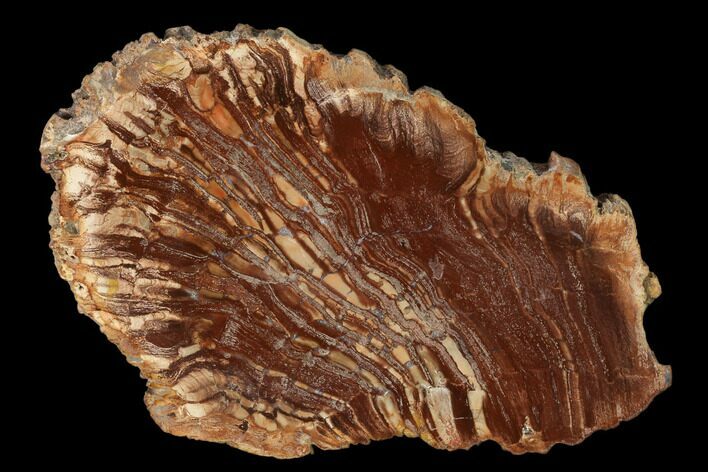This Specimen has been sold.
5.6" Petrified Horsetail (Calamites?) From Madagascar - Rare!
While nearly all of the Triassic petrified wood from Madagascar comes from conifers (Araucaria) this is something different. It appears to be a fossilized horsetail (Calamites?). These petrified horsetails represent far less than 1% of the petrified wood I've been from Madagascar.
This slab is 5.6" wide and polished to a lustrous finish on both sides. It comes with an acrylic display stand.
Calamites is a genus of extinct arborescent (tree-like) horsetails to which the modern horsetails are closely related. Unlike their modern cousins, these plants were medium-sized trees, growing to heights of more than 30 meters (100 feet).
The trunks of Calamites had a distinctive segmented, bamboo-like appearance and vertical ribbing. The branches, leaves and cones were all borne in whorls. The leaves were needle-shaped, with up to 25 per whorl. The stems of modern horsetails are typically hollow or contain numerous elongated air-filled sacs. Calamites was similar in that its trunk and stems were hollow, like wooden tubes. When these trunks buckled and broke, they could fill with sediment. This is the reason pith casts of the inside of Calamites stems are so common as fossils.
This slab is 5.6" wide and polished to a lustrous finish on both sides. It comes with an acrylic display stand.
Calamites is a genus of extinct arborescent (tree-like) horsetails to which the modern horsetails are closely related. Unlike their modern cousins, these plants were medium-sized trees, growing to heights of more than 30 meters (100 feet).
The trunks of Calamites had a distinctive segmented, bamboo-like appearance and vertical ribbing. The branches, leaves and cones were all borne in whorls. The leaves were needle-shaped, with up to 25 per whorl. The stems of modern horsetails are typically hollow or contain numerous elongated air-filled sacs. Calamites was similar in that its trunk and stems were hollow, like wooden tubes. When these trunks buckled and broke, they could fill with sediment. This is the reason pith casts of the inside of Calamites stems are so common as fossils.
SPECIES
Calamites?
LOCATION
Ambilobe, Madagascar
FORMATION
Isalo II Formation
SIZE
5.6 x 3.6", .6" thick
CATEGORY
SUB CATEGORY
ITEM
#157851
We guarantee the authenticity of all of our specimens.
 Reviews
Reviews











